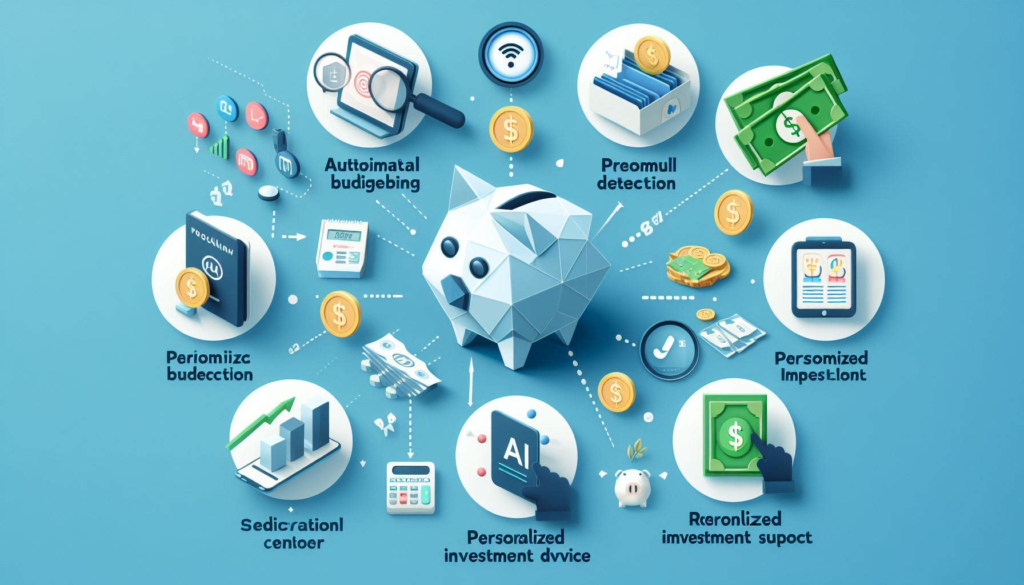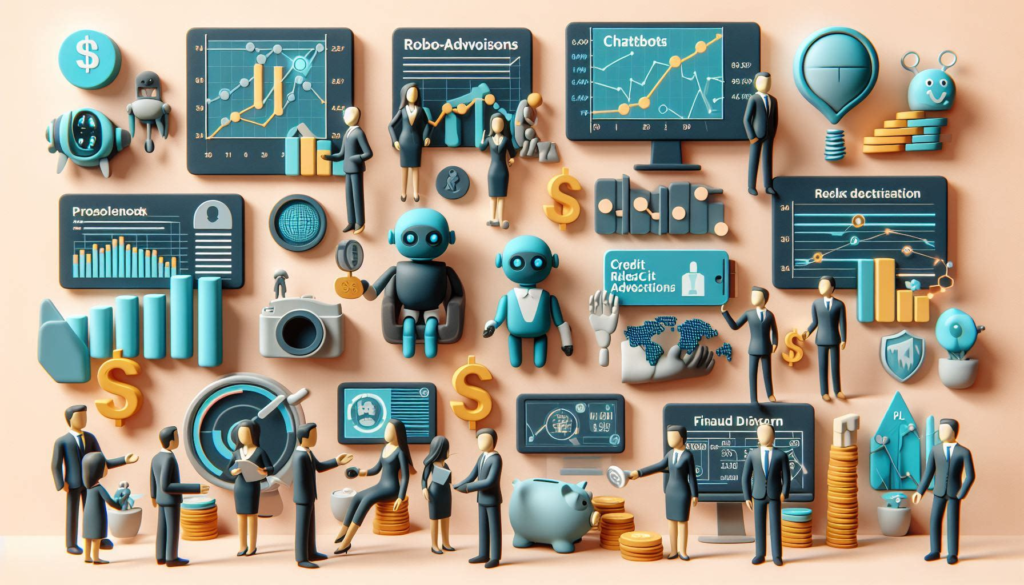Imagine a world where managing your finances is as easy as asking a question. “How much did I spend on groceries last month?” “What’s the best way to save for my child’s education?” “Should I invest in stocks or bonds?” These are questions that many of us grapple with on a daily basis. But what if you had a personal financial advisor at your fingertips, ready to provide advice tailored to your unique financial situation and goals? This is not a distant dream, but a reality that is being shaped by the advent of artificial intelligence (AI) in personal finance.

AI, with its ability to analyze vast amounts of data and learn from it, is revolutionizing the world of personal finance. It’s like having a personal financial advisor in your pocket, one that knows your spending habits, your financial goals, and your risk tolerance. It can provide personalized financial advice, automate tedious tasks, and even predict future financial trends.
But this is just the tip of the iceberg. As we delve deeper into this topic, we’ll explore how AI is reshaping various aspects of personal finance, from budgeting and investing to savings and insurance. We’ll look at the benefits and challenges, delve into real-world case studies, and gaze into the future of personal finance with AI.
So, are you ready to embark on this journey? Let’s dive in!
The Evolution of Personal Finance
Let’s take a step back in time. Remember when personal finance meant keeping a ledger of income and expenses, manually balancing a checkbook, and physically visiting a bank to make transactions? Those were the days when managing finances was a time-consuming and often confusing task.

Fast forward to the digital age. The advent of the internet brought about online banking, allowing us to manage our finances from the comfort of our homes. We saw the rise of digital payments, making transactions quicker and more convenient. Financial apps started popping up, offering tools for budgeting, investing, and tracking expenses. Personal finance was no longer just about money; it was about data, and lots of it.
But as the amount of financial data grew, so did the complexity of managing it. Enter artificial intelligence (AI). With its ability to analyze vast amounts of data and learn from it, AI has taken personal finance to a whole new level. It has transformed the way we budget, invest, save, and even think about money.
From manual ledgers to AI-powered financial advisors, the evolution of personal finance has been nothing short of remarkable. And as we’ll see in the next sections, this is just the beginning. The future of personal finance with AI holds even more exciting possibilities.
The Advent of AI in Personal Finance
Have you ever wondered how it would feel to have a personal financial advisor who knows you inside out? One who understands your spending habits, your financial goals, and your risk tolerance? Well, that’s exactly what AI brings to the table in the realm of personal finance.

AI, or artificial intelligence, is a game-changer in the world of personal finance. It’s like having a financial guru in your pocket, ready to provide advice tailored to your unique financial situation and goals. But how does it do that? Let’s break it down.
AI works by analyzing vast amounts of data and learning from it. It uses complex algorithms to identify patterns and trends in your financial behavior. For instance, it can track your spending habits, categorize your expenses, and provide a clear picture of where your money is going. This can help you make more informed decisions about your finances and achieve your financial goals more effectively.
But that’s not all. AI can also automate tedious tasks such as budgeting and expense tracking. It can even predict future financial trends based on historical data and current market conditions. This can be incredibly helpful when it comes to investing and saving for the future.
Moreover, AI can provide personalized financial advice. Based on your financial goals and risk tolerance, it can suggest the best investment strategies and savings plans for you. It can also alert you to potential financial risks and opportunities, helping you stay one step ahead.
Benefits of AI in Personal Finance
Let’s dive into the many benefits that AI brings to the world of personal finance. From budgeting to investing, AI is not just a tool, but a game-changer.

AI for Budgeting:
Ever found yourself wondering where all your money went at the end of the month? With AI, you don’t have to wonder anymore. AI can analyze your spending habits, categorize your expenses, and provide a clear picture of where your money is going. It can even suggest ways to cut costs and improve your financial health. It’s like having a personal accountant who keeps track of every penny you spend.
AI for Investments:
Investing can be a daunting task, especially for those who are new to it. But with AI, it doesn’t have to be. AI can analyze market trends and make investment recommendations based on your financial goals and risk tolerance. It takes the guesswork out of investing and helps you make informed decisions.
AI for Savings:
Saving money is a crucial part of personal finance. But how much should you save? And where should you put your savings? AI can help with that too. It can help you set savings goals and automatically transfer money into your savings account. It can also suggest the best savings plans based on your income, expenses, and financial goals.
But the benefits of AI in personal finance don’t stop there. AI can also help with debt management, tax planning, retirement planning, and much more. It can provide personalized financial advice, alert you to potential financial risks, and even predict future financial trends.
Risks and Challenges
While the benefits of AI in personal finance are numerous, it’s important to also consider the risks and challenges that come with it. After all, no technology is perfect, and AI is no exception.

Data Privacy:
One of the biggest concerns with AI in personal finance is data privacy. AI requires access to your financial data to function effectively. This includes sensitive information like your income, expenses, savings, investments, and more. While most AI applications have robust security measures in place, the risk of data breaches cannot be completely eliminated. It’s crucial to ensure that any AI tool you use takes data privacy seriously and complies with all relevant regulations.
Dependence on Technology:
Another challenge is the risk of becoming overly dependent on technology. While AI can simplify personal finance, it’s important to remember that it’s just a tool. It’s there to assist you, not make decisions for you. You should still take the time to understand your finances and make informed decisions. After all, it’s your money, and you should be in control.
Accuracy of AI Predictions:
AI uses algorithms and historical data to make predictions about future financial trends. However, these predictions are not always accurate. The financial market is influenced by a multitude of factors, many of which are unpredictable. Therefore, while AI can provide valuable insights, it’s important to take its predictions with a grain of salt.
Case Studies
Let’s take a look at some real-world examples of how AI is being used in personal finance.

AI in Banking:
Consider the case of a leading bank that has integrated AI into its services. The bank uses AI to analyze customers’ spending habits and provide personalized financial advice. For instance, if the AI notices that a customer is spending a large amount on dining out, it might suggest ways to cut back and save money. The bank also uses AI to detect fraudulent transactions. If the AI detects unusual activity on a customer’s account, it can alert the customer and take necessary action to prevent fraud.
AI in Insurance:
Another example is an insurance company that uses AI to streamline the claims process. When a customer files a claim, the AI can quickly analyze the claim, check it against the customer’s policy, and determine the payout amount. This not only speeds up the claims process but also reduces the risk of human error. The company also uses AI to detect fraudulent claims. By analyzing patterns and trends in claims data, the AI can identify suspicious activity and alert the company.
These case studies illustrate the potential of AI in personal finance. By automating tedious tasks, providing personalized advice, and detecting fraud, AI is not only making personal finance easier but also more efficient and secure.
The Future of Personal Finance with AI
As we look ahead, the future of personal finance with AI seems bright and promising. The advent of AI has already begun to transform the landscape of personal finance, and this is just the beginning.

Imagine a future where AI not only helps you manage your finances but also predicts your financial needs even before you realize them. A future where AI not only advises you on your investments but also automatically adjusts your portfolio based on market trends and your financial goals.
In the realm of savings, AI could potentially help you save money without you even realizing it. By analyzing your spending habits and income, AI could automatically set aside a portion of your income into your savings account. It could also suggest the best savings plans and investment options based on your financial goals and risk tolerance.
AI could also revolutionize the way we plan for retirement. By analyzing your income, expenses, and life expectancy, AI could provide a personalized retirement plan. It could suggest the best retirement savings plans and even predict the cost of living in your retirement years.
In the world of insurance, AI could streamline the claims process even further. It could automatically process claims and payouts, reducing the need for human intervention. It could also use predictive analytics to detect fraudulent claims and prevent insurance fraud.
But perhaps the most exciting prospect is the idea of a virtual financial advisor. This AI-powered advisor could provide personalized financial advice 24/7. It could answer your financial queries, provide investment advice, help with budgeting and savings, and much more.
Conclusion
As we come to the end of our exploration of AI in personal finance, it’s clear that this technology has the potential to revolutionize the way we manage our money. From budgeting and investing to savings and insurance, AI is making personal finance more efficient, smarter, and personalized.

However, as with any technology, it’s important to approach AI with a balanced perspective. While it offers numerous benefits, it also comes with its own set of risks and challenges. Data privacy, dependence on technology, and the accuracy of AI predictions are all factors that need to be considered.
Moreover, while AI can provide valuable insights and automate tedious tasks, it’s important to remember that it’s just a tool. It’s there to assist us, not make decisions for us. We should still take the time to understand our finances and make informed decisions.
In the end, the goal of personal finance is not just to make money, but to make informed and responsible financial decisions. And with AI by our side, this goal seems more achievable than ever.
So, as we embrace the future of personal finance with AI, let’s remember to use this technology as a tool to enhance our financial decisions, not replace them. After all, it’s our money, and we should be in control.
